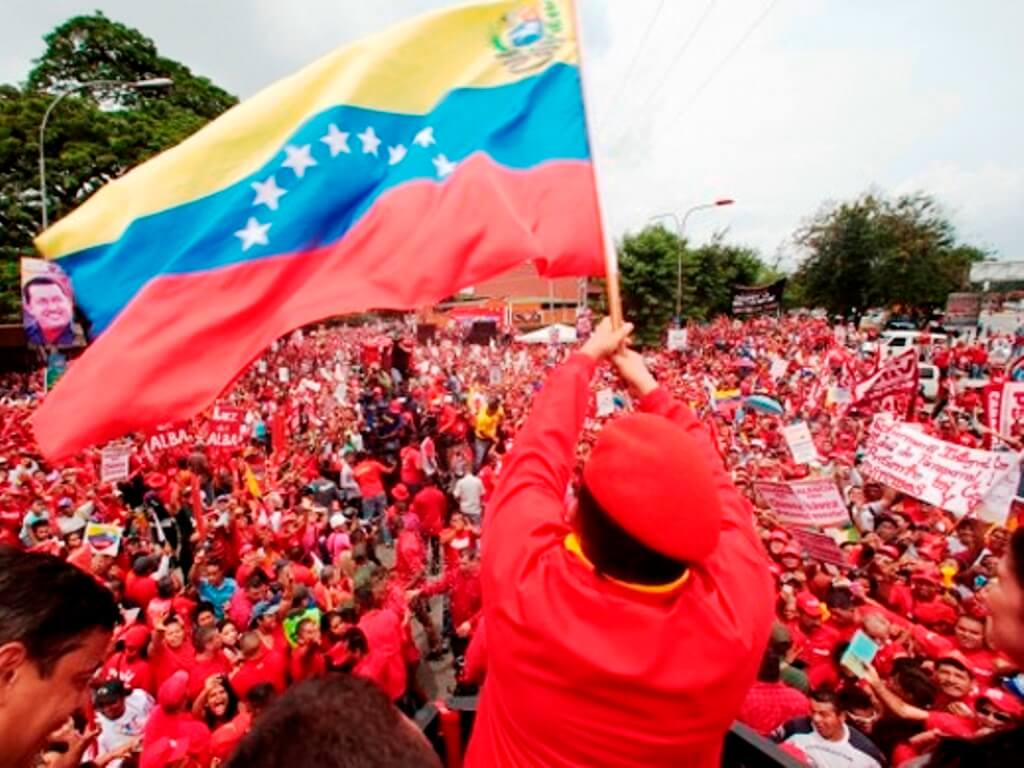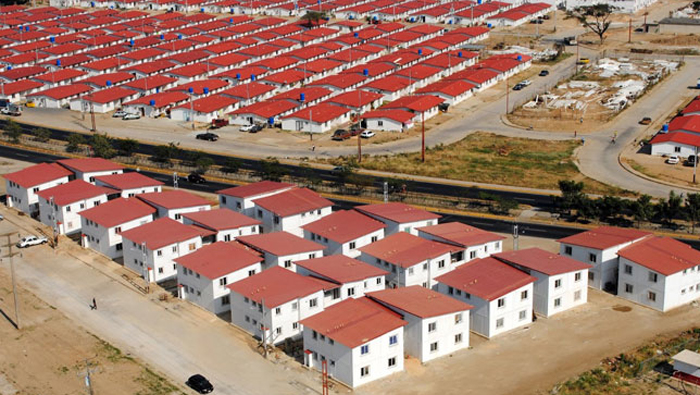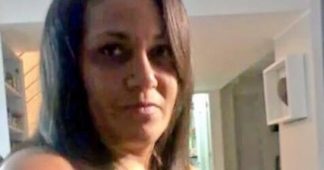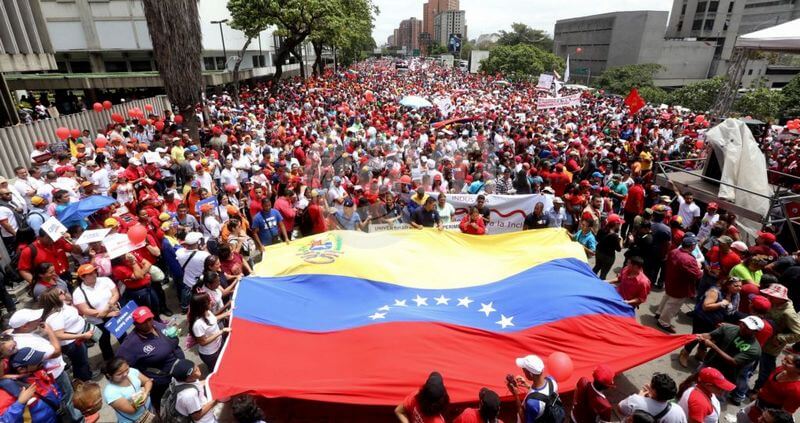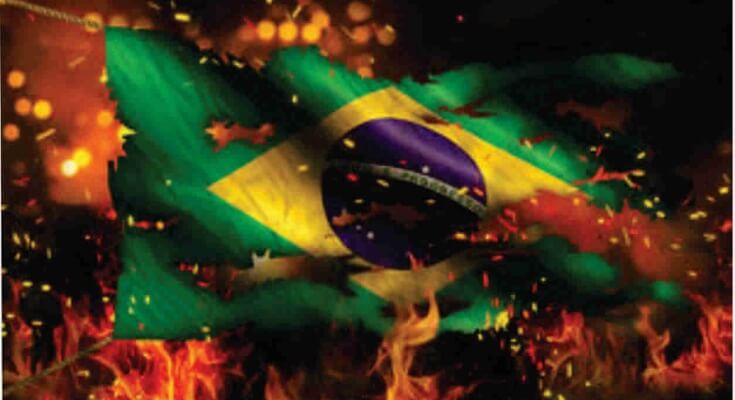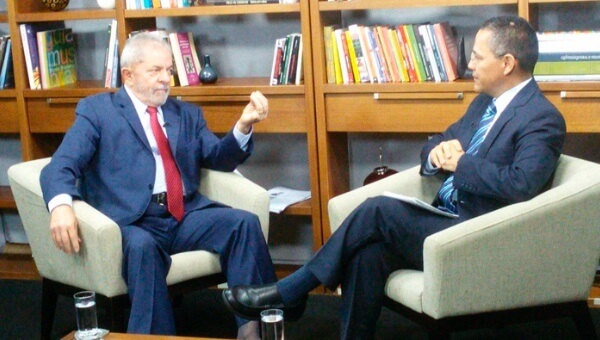by MIKE WHITNEY
“Hugo Chavez defied the most powerful interests, and he refused to bow down….I believe there is a very strong possibility that President Chavez was assassinated.”
Eva Golinger
MW– Do you think that Hugo Chavez was murdered and, if so, who do you think might have been involved?
Eva Golinger– I believe there is a very strong possibility that President Chavez was assassinated. There were notorious and documented assassination attempts against him throughout his presidency. Most notable was the April 11, 2002 coup d’etat, during which he was kidnapped and set to be assassinated had it not been for the unprecedented uprising of the Venezuelan people and loyal military forces that rescued him and returned him to power within 48 hours. I was able to find irrefutable evidence using the US Freedom of Information Act (FOIA), that the CIA and other US agencies were behind that coup and supported, financially, militarily and politically, those involved. Later on, there were other attempts against Chavez and his government, such as in 2004 when dozens of Colombian paramilitary forces were captured on a farm outside of Caracas that was owned by an anti-Chavez activist, Robert Alonso, just days before they were going to attack the presidential palace and kill Chavez.
There was another, lesser-known plot against Chavez discovered in New York City during his visit to the United Nations General Assembly in September 2006. According to information provided by his security services, during standard security reconnaissance of an event where Chavez would address the US public at a local, renowned university, high levels of radiation were detected in the chair where he would have sat. The radiation was discovered by a Geiger detector, which is a handheld radiation detection device the presidential security used to ensure the President wasn’t in danger of exposure to harmful rays. In this case, the chair was removed and subsequent tests showed it was emanating unusual amounts of radiation that could have resulted in significant harm to Chavez had it gone undiscovered. According to accounts by the presidential security at the event, an individual from the US who had been involved in the logistical support for the event and had provided the chair was shown to be acting with US intelligent agents.
There were numerous other attempts on his life that were thwarted by the Venezuelan intelligence agencies and particularly the counterintelligence unit of the Presidential Guard that was charged with discovering and impeding such threats. One other well known attempt was in July 2010 when Francisco Chavez Abarca (no relation), a criminal working with Cuban-born terrorist Luis Posada Carriles, responsible for bombing a Cuban airliner in 1976 and killing all 73 passengers on board, was detained entering Venezuela and later confessed he had been sent to assassinate Chavez. Just five months earlier, in February 2010, when President Chavez was at an event near the Colombian border, his security forces discovered a sniper set up just over a quarter of a mile away from his location, who was subsequently neutralized.
While these accounts may sound like fiction, they are amply documented and very real. Hugo Chavez defied the most powerful interests, and he refused to bow down. As head of state of the nation without the largest oil reserves on the planet, and as someone who openly and directly challenged US and Western domination, Chavez was considered an enemy of Washington and its allies.
So, who could have been involved in Chavez’s assassination, if he was assassinated? Certainly it’s no far stretch to imagine the US government involved in a political assassination of an enemy it clearly – and openly – wanted out of the picture. In 2006, the US government formed a special Mission Manager for Venezuela and Cuba under the Directorate of National Intelligence. This elite intelligence unit was charged with expanding covert operations against Chavez and led clandestine missions out of an intelligence fusion center (CIA-DEA-DIA) in Colombia. Some of the pieces that have been coming together include the discovery of several close aides to Chavez who had private, unobstructed access to him over prolonged periods, who fled the country after his death and are collaborating with the US government. If he were assassinated by some kind of exposure to high levels of radiation, or otherwise inoculated or infected by a cancer-causing virus, it would have been done by someone with close access to him, whom he trusted.
MW– Who is Leamsy Salazar and how is he connected to the US Intelligence Agencies?
Eva Golinger– Leamsy Salazar was one of Chavez’s closest aides for nearly seven years. He was a Lieutenant Colonel in the Venezuelan Navy and became known to Chavez after he waved the Venezuelan flag from the roof of the presidential guard’s barracks at the presidential palace during the 2002 coup, as the rescue of Chavez was underway. He became a symbol of the loyal armed forces that helped defeat the coup and Chavez rewarded him by bringing him on as one of his assistants. Salazar was both a bodyguard and an aide to Chavez, who would bring him coffee and meals, stand by his side, travel with him around the world and protect him during public events. I knew him and interacted with him many times. He was one of the familiar faces protecting Chavez for many years. He was a key member of Chavez’s elite inner security circle, with private access to Chavez and privileged and highly confidential knowledge of Chavez’s comings and goings, daily routine, schedule and dealings.
After Chavez passed away in March 2013, because of his extended service and loyalty, Leamsy was transferred to the security detail of Diosdado Cabello, who was then president of Venezuela’s National Assembly and considered one of the most powerful political and military figures in the country. Cabello was one of Chavez’s closest allies. It should be noted that Leamsy remained with Chavez throughout most of his illness up to his death and had privileged access to him that few had, even from his security team.
Shockingly, in December 2014, news reports revealed that Leamsy had secretly been flown to the US from Spain, where he was allegedly on vacation with his family. The plane that flew him was said to be from the DEA. He was placed in witness protection and news reports have stated he is providing information to the US government about Venezuelan officials involved in a high level ring of drug trafficking. Opposition-owned media in Venezuela claim he gave details accusing Diosdado Cabello of being a drug-kingpin, but none of that information has been independently verified, nor have any court records or allegations been released, if they exist.
Another explanation for his going into the witness protection program in the US could include his involvement in the assassination of Chavez, possibly done as part of a CIA black op, or maybe even done under the auspices of CIA but carried out by corrupt elements within the Venezuelan government. Before the Panama Papers were released, I had accidentally discovered and was investigating a dangerous corrupt, high level individual within the government, who Chavez had previously dismissed, but who returned after his death and was placed in an even more influential, powerful position. This individual also appears to be collaborating with the US government. People like that, who let greed obscure their conscience, and who are involved in lucrative criminal activity, could have also played a role in his death.
For example, the Panama Papers exposed another former Chavez aide, Army Captain Adrian Velasquez, who was in charge of security for Chavez’s son Hugo. Captain Velasquez’s wife, a former Navy Officer, Claudia Patricia Diaz Guillen, was Chavez’s nurse for several years and had private, unsupervised access to him. Furthermore, Claudia administered medicines, shots and other health and food-related materials to Chavez over a period of years. Just one month before his deadly illness was discovered in 2011, Chavez named Claudia as Treasurer of Venezuela, placing her in charge of the country’s money. It’s still unclear as to why she was named to this important position, considering she had previously been his nurse and had no similar experience. She was dismissed from the position right after Chavez passed away. Both Captain Velasquez and Claudia appeared in the Panama Papers as owning a shell company with millions of dollars. They also own property in an elite area in the Dominican Republic, Punta Cana, where properties cost in the millions, and they have resided there since at least June 2015. The documents show that right after Chavez passed away and Nicolas Maduro was elected president in April 2013, Captain Velasquez opened an off-shore company on April 18, 2013 through the Panamanian firm Mossack Fonesca, called Bleckner Associates Limited. A Swiss financial investment firm, V3 Capital Partners LLC, affirmed they manage the funds of Captain Velasquez, which number in the millions. It’s impossible for an Army Captain to have earned that amount of money through legitimate means. Neither him nor his wife, Claudia, have returned to Venezuela since 2015.
Captain Velasquez was especially close with Leamsy Salazar.
MW– Can you explain the suspicious circumstances under which Salazar was flown out of Spain to the safety of the United States on a plane belonging to the Drug Enforcement Administration (DEA)? Doesn’t that strike you as a bit strange? At the very least, this suggests that Salazar was acting as an agent for a country that is openly hostile towards Venezuela? That makes him either a collaborator or a traitor. Do you agree?
Eva Golinger– Of course it was highly suspicious that Salazar was flown out of Spain, where he was allegedly on vacation with his family, and taken to the United States on a DEA plane. There is no question that he was collaborating with the US government and betrayed his country. What remains to be seen is what his exact role was. Did he administer the murderous poison to Chavez, or was it one of his partners, such as Captain Velasquez or the nurse/treasurer Claudia?
While this all may sound very conspiracy theory-ish, these are facts that can be verified independently. It is also true, according to declassified secret US documents, that the US Army was developing an injectable radiation weapon to use for political assassinations of select enemies as far back as 1948. The Church Commission hearings into the Kennedy Assassination also uncovered the existence of an assassination weapon developed by CIA to induce heart attacks and soft-tissue cancers. Chavez died of an aggressive soft-tissue cancer. By the time it was detected it was too late. There is other information out there documenting the development of a “cancer virus” that was going to be weaponized and allegedly used to kill Fidel Castro in the 1960s. I know most of that seems like science fiction, but do your research and see what really exists. I don’t believe everything I read either. As a lawyer and investigative journalist, I need hard evidence, and multiple, verifiable sources. Even if we just go on the official US Army document from 1948, it’s a fact that the US government was in the process of a developing a radiation weapon for political assassinations. More than 60 years later we can only imagine what technological capacities exist.
MW– Can you explain why the DEA was involved in this operation and not the CIA as many would expect?
Eva Golinger– I think CIA was involved. They work together on high-profile political cases, and they were operating out of the Intelligence Fusion Center in Colombia together. Why it was DEA and not CIA that brought Leamsy Salazar to the US has not yet been revealed, but I don’t think that means the CIA wasn’t involved in the whole operation.
MW– On a personal note, Hugo Chavez was a giant among men and a real hero. Would you please tell us what his loss has meant to you personally and how his death has impacted the people of Venezuela?
Eva Golinger– The loss of Hugo Chavez has been crushing. He was my friend and I spent nearly ten years as his advisor. The void he has left is impossible to replace. Despite his human flaws, he had a huge heart and genuinely dedicated himself to build a better country for his people, and a better world for humanity. He cared deeply about all people, but especially the poor, neglected and marginalized.
There is a picture taken of Chavez by a bystander, when he had been at an event in the center of Caracas and was walking through a large plaza that had been cleared by security. All of a sudden, he saw a young man, disheveled and seemingly on drugs, barely able to keep himself upright, wearing ragged clothes. To the horror of his security guards, Chavez went over to him and lovingly put his arm around him and offered him a cup of coffee. He didn’t judge the poor guy or reprimand him, or show disgust. He treated him like a fellow human being who deserved to be seen with dignity. He stayed there with him for a while, just telling stories and chatting like old friends. When he had to go, he told one of his guards to offer the man whatever help he needed.
There were no cameras there, no TV, no public. It wasn’t a publicity stunt. It was genuine, sincere care and concern for a fellow human in need. Despite being president and a powerful head of state, Chavez always saw himself as an equal to all people.
His unexpected death has had a tragic toll on Venezuela. Sadly, those he left in charge have been unable to manage the country through this difficult times. A combination of corruption and external sabotage by opposition forces (with foreign support) has crippled the economy. Mismanagement has been widespread and destructive. US agencies and their allies in Venezuela have seized the opportunity to further destabilize and destroy all remaining remnants of chavismo. Now they are trying to tarnish and erase Chavez’s legacy, but I believe this is an impossible task. Even if the current government doesn’t survive the vicious attacks against it, Chavez’s memory in the millions of people he impacted and improved the lives of, will weather the storm. “Chavismo” has become an ideology founded on principles of social justice and human dignity. But do people miss him terribly? Yes.
Eva Golinger is winner of the International Award for Journalism in Mexico (2009), named “La Novia de Venezuela” by President Hugo Chávez, is an Attorney and Writer from New York, living in Caracas, Venezuela since 2005 and author of the best-selling books, “The Chávez Code: Cracking US Intervention in Venezuela” (2006 Olive Branch Press), “Bush vs. Chávez: Washington’s War on Venezuela” (2007, Monthly Review Press)
Since 2003, Eva has been investigating, analyzing and writing about US intervention in Venezuela using the Freedom of Information Act (FOIA) to obtain information about US Government efforts to undermine progressive movements in Latin America.
